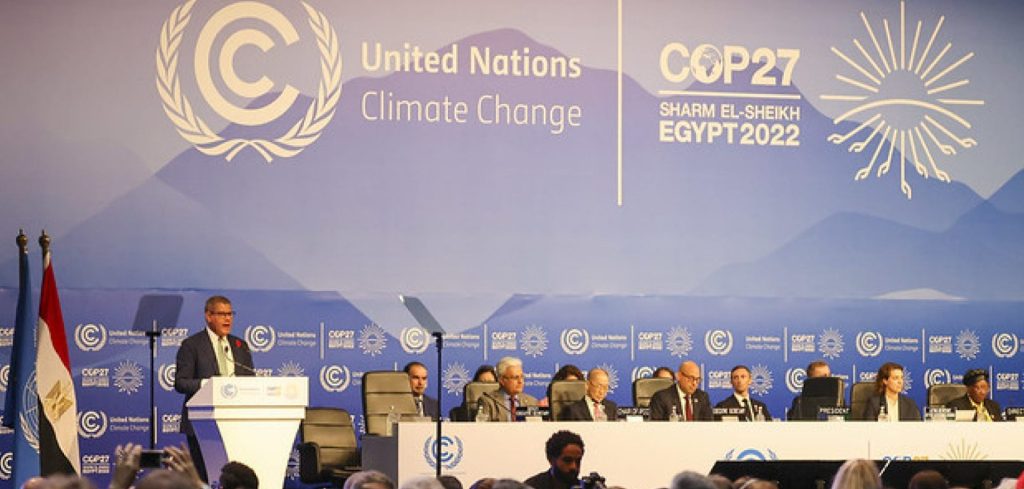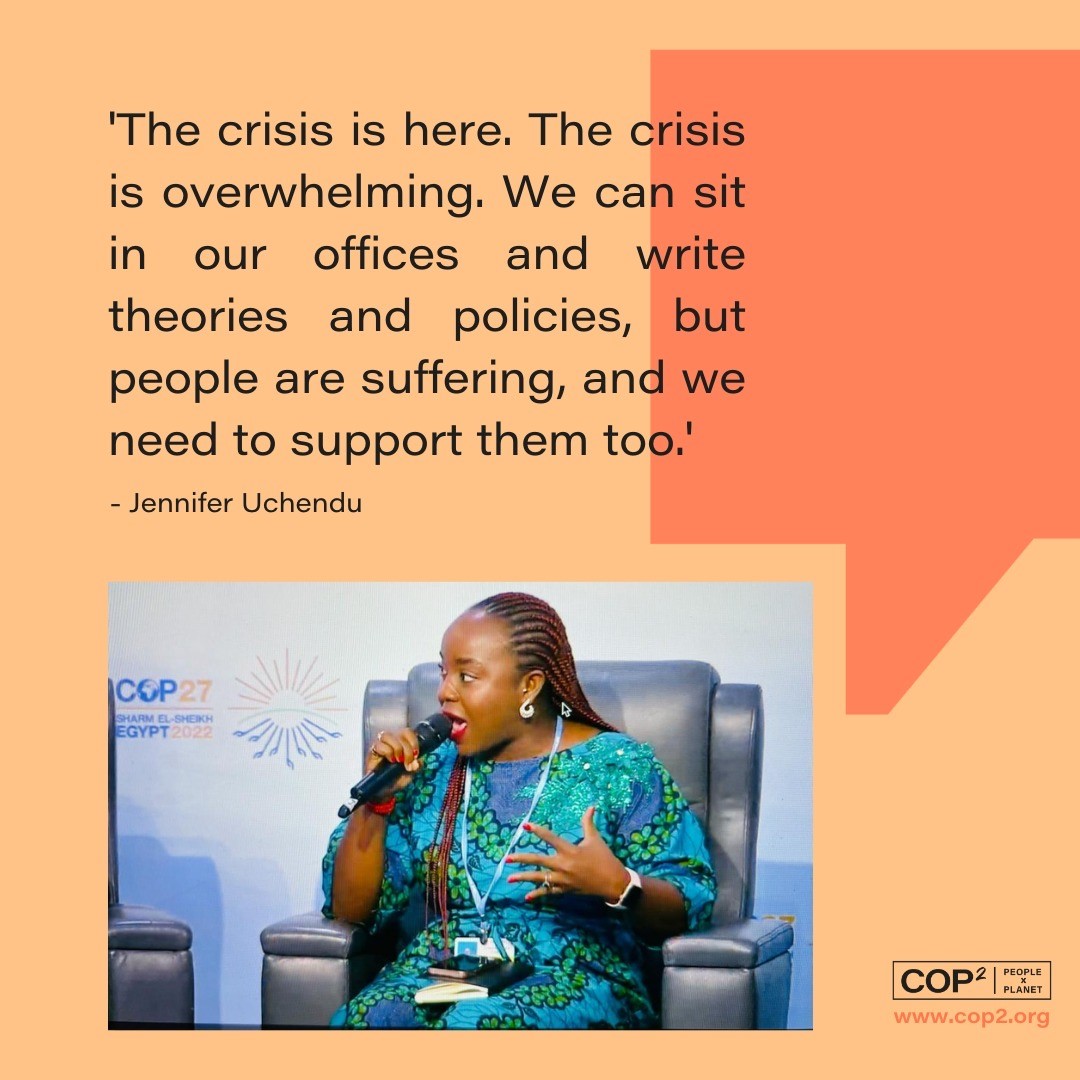Dr Emma Lawrance, Lead Policy Fellow for Mental Health, IGHI and Jessica Newberry Le Vay, Junior Policy Fellow in Climate Change and Health are part of Climate Cares.

(Credit: Rory Arnold / No 10 Downing Street)
In November 2022, we brought discussions about the interconnections between climate change and mental health and wellbeing to COP27 in Sharm el-Sheikh in Egypt – at the 27th United Nations Climate Change Conference. This was only the second time that mental health has been a focus of COP events, with our COP26 Resilience Hub event the first, and overdue. We built new relationships with others who work in the climate change and mental health space, fostering community and collaboration. We published papers bringing together voices from all corners of the globe. And we were exhausted! But we pitched for funding to do more, and have big plans for 2023 to deliver on our vision to better understand and support mental health and wellbeing in the climate crisis.
About Climate Cares
Climate Cares is a team of researchers, designers, policy experts and educators, based at Imperial College London. Our aim is for individuals, communities and healthcare systems to have the knowledge, tools, and resources to become resilient to the mental health impacts of the climate crisis. We lead the programme of work to help create a future that centres caring for people and the planet: Watch this short video on Twitter to learn more.
When we were at COP, we were really excited for in person meetings with collaborators, some of whom we had met only virtually over many, many calls! We were also eager to learn and bring discussions about mental health in the climate crisis up the agenda. But honestly, the emotions ran deeper than that – the guilt of flying there, the pressure to respond to the urgent need for change through our work, feeling energised by and connected to all those working to make change, and the mix of overwhelm and marvel that this topic was once more on the global stage.
At the launch of COP2, Care of People x Planet, we listened to Jennifer Uchendu capture the room with her powerful reflections on the emotional toll of working in this sphere, and the burden on the many already living with the effects of the climate crisis. And in fact, mental health was raised as an issue in many COP spaces – you can read more about our experience at COP in our Grantham Institute blog post.
Collaborating on climate
Though COP27 was one of our highlights of the past year, it wasn’t all we did.
- We published a special issue in the International Journal of Psychiatry on Climate Change and Mental Wellbeing.
Climate Cares’ papers for the Special issue of the International Review of Psychiatry: Climate Change and Mental Wellbeing :
- Diffey et al 2022, Not about us without us – the feelings and hopes of young people around the world in the climate crisis, International Review of Psychiatry
- Li et al 2022, The Role for Mental Health Professionals in the Climate Crisis: An Urgent Call to Action, International Review of Psychiatry
- Samuel et al 2022, Reflections of Mental Health Professionals on working with and in the Climate Crisis, International Review of Psychiatry:
- Lawrance et al 2022, The Impact of Climate Change on Mental Health and Emotional Wellbeing: A Narrative Review of Current Evidence, and its Implications, International Review of Psychiatry
-
- We worked with COP2, Care of People x Planet, to develop and run workshops.
- Our Changing Worlds International study continued, working with international partners in India, the Caribbean, the USA and the Philippines to understand how young people are thinking, feeling and responding to the climate crisis and other significant crises like the COVID-19 pandemic. We brought together voices from around the globe, co-hosting a seminar with the Planetary Health Alliance, and published our UK results.
Yet with all this important, impactful, and interesting work, we – like many others working in this space – questioned our own resilience and capacity to do this psychologically difficult work.
Mental capacity
“As we all come here together, have we checked in mentally about whether we have the mental capacity to do this work?” – Jennifer Uchendu at the launch of COP2

At COP27, there was no on-the-ground mental health support for delegates, despite critical need. That support can look like open and supportive spaces to come together to discuss emotions, to provide much needed validation and recognition that COP can be an emotionally challenging time.
However, it’s not only physically at COP where support is needed; this is a time of increased media reporting on the climate crisis and a spotlight on inaction from leaders, which can impact people everywhere. Force of Nature recognised this need to look not only at the events in Egypt but also to help people feel connected and supported within their own communities. They equipped young people across the UK to host Climate Cafes in their own communities to connect, navigate climate emotions, and inspire action.
How does it feel?
Being part of Climate Cares also means holding knowledge about the climate crisis: we are constantly in touch with information on the scale and severity of the problem, and have strong emotional ties with our work and the environment. This awareness can make people who work in this space more vulnerable to negative psychological impacts and traumatic stress, which might be experienced as feelings of grief, hopelessness and isolation, passing on stress to others, and burnout (Pihkala 2019).
Organisational cultures can exacerbate these impacts, through cultural norms “that degrade or dismiss the role of emotion… [which] may not afford environmentalists the opportunity to express emotions that plague them continually.” (Fraser et al, 2013).
Professor Steve Simpson, University of Exeter, described the pressure felt in some working cultures that don’t allow much processing of emotion: “Lots of scientists […] feel we should be objective and robust, not at the mercy of our emotions.”
We also hear anecdotally of environmental sciences students being put off pursuing careers in their field for fear of the mental health impacts.
All of the above is exacerbated by witnessing climate inaction: from leaders – where perceived inaction and betrayal from leaders can negatively impact mental health and wellbeing – and from workplaces (43% of young people report lack of environmental action from their employers affected their mental wellbeing, Bupa survey).
These negative psychological impacts of engaging with the climate crisis are not limited to just those formally working in this space, but to anyone who cares or takes action. However, we come from a place of relative privilege. By far the biggest burden is on people living with the impacts of the climate crisis directly, and those who don’t have access to the support and security that we do.
We need sustainability leaders and activists to continue their work, to support individuals to cope with these emotions, to enable communities and societies to respond.

Emma “I feel motivated and grateful to be able to do this work and connect with the many people who are making smart and kind decisions for a healthier future. Simultaneously, I can feel overwhelmed by the urgency and pace of many aspects of this work. Holding these experiences and trying to come to terms with our changing world in my own life can be draining. But working with Climate Cares is also truly exciting and inspiring.”
Jess “I feel constantly inspired by the people I get to work with, both in Climate Cares and with our many amazing collaborators. Feeling part of a community that is all working towards a shared vision of a better future is energising, motivating and hopeful. I’m finding that working in this space comes with a sense of exhaustion I haven’t experienced before, and I can’t easily switch off. But I’m learning to hold both the energising and the exhausting parts of this work together, and ultimately I feel such gratitude to get to do this work and do it within such an inspiring, creative, collaborative community.”
Building resilience in climate careers
It’s vital we provide support to process these difficult and sometimes draining experiences , to sustain and support people who work in climate careers. But also, we want to work towards a world where every career is a climate career – so how do we bring this into everyone’s work in a way which supports and protects their wellbeing?
One step towards that is the work we are doing with the Climate Change Committee – responsible for advising the UK government on climate change – which holds a monthly wellbeing session to create space for their staff to reflect and share their feelings about working in climate change. This is a brilliant example of how an organisation can support their staff by acknowledging their staff might be sitting with challenging emotions, and dedicating time and space to wellbeing
We want to support resilience, prevent burnout, and increase the longevity of our work. But there’s a lot we don’t know about how people working in climate careers are being impacted – what impacts are being felt, and what interventions are wanted and needed. So we are working to deliver more research on this. COP2 is one organisation that is building emotional and social resilience, strengthening our capacity to care for ourselves, each other and the planet.
Our plans for 2023 include addressing the disconnection across sectors. We want to facilitate connection and set the agenda for climate and mental health research, with collaborators from around the world, starting with global dialogues – to set the research agenda, informed by lived experience.
We feel equipped to do this, and through regular mental health check-ins in our own team and the wellbeing activities of other organisations, we feel excited to deliver this programme.
Find out more about Climate Cares on our webpage, send the team an email climatecares@imperial.ac.uk, and follow us on Twitter @ClimateCares.